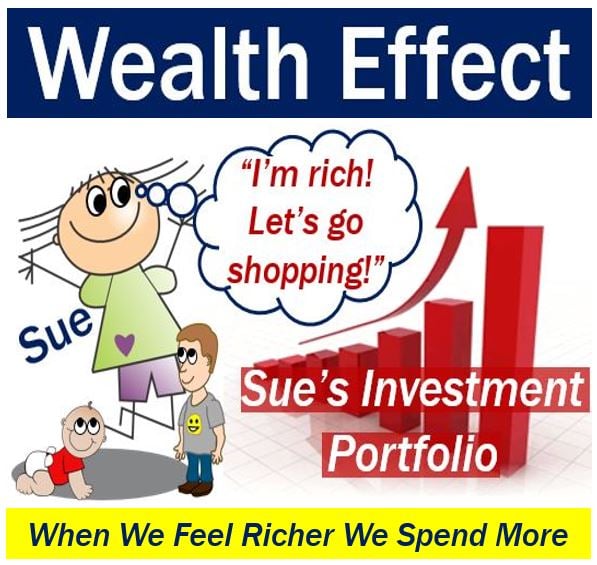Much of the rationale behind QE has been that it creates what the Fed calls a “Wealth Effect.” For years this has been a key driver of central bank policy. This view is firmly embedded in the macro-econometric models used by the Fed. The notion, widely adopted by central bankers, is that by inflating asset prices to make the wealthy (the asset holders) even wealthier, these people will spend more of what they see as free money from asset price inflation. The premise is that this additional spending will create additional demand for goods and services thus providing jobs for the masses.
Sadly, several times over the years the wealth effect formula has slid off the tracks and most likely will again. Consumption does not create wealth, it creates debt. The example that stands out in the minds of most people is from back in 2008. By loaning money against homes with little scrutiny as to the borrower's ability to repay them the Fed created a financial bubble with broad implications. It could be argued that since 2008, Fed policy has never really addressed that mess but attempted to paper over it by printing money and expanding debt through quantitative easing.
 |
| Wealth Effect Policies Have Failed To Generate Enough Growth |
Looking back at how pursuing policies that breed the Wealth Effect can slide off track or lose their effectiveness, we see it always centers on the risk they create. At some point, the combination of easy-to-borrow money at low-interest rates tends to morph into a high-risk environment of increased speculation and leverage. In short, savers and investors seeking a return on their savings are forced out of traditional accounts because such investments get ravaged by inflation.
 |
| Many Consumers Bought Into This |
It is again becoming very apparent the wealth effect policies are failing. Not only have they failed to create a healthy economy but they have brought the financial system to the brink of collapse. Following the GFC the Federal Reserve and the Bush administration spent hundreds of billions of dollars to add liquidity to the financial markets. They worked hard to avoid a complete collapse. They almost didn't succeed. Today we are spending not billions, but trillions of dollars to keep the same corrupt policy moving forward.
History shows investors should treat the wealth effect with caution because it is susceptible to reversals. Since the GFC, attempt after attempt has been put forth to change the tide, but still, we have watched the middle class shrink. The elephant in the room when it comes to growing the economy is how "the broken window theory" is spun and interpreted. The gist of this theory is that if a window is broken, the subsequent repair expenditure will have no net benefits for the economy. Still, it is not uncommon to see destruction touted as a good thing because it promotes spending. In truth, the idea destruction is good discounts several facts.
One has to do with where the
money is coming from but whether it is from an insurance company or someplace else, it still means the money is diverted from being used on another
purchase. Repairing
a broken window is maintenance spending which doesn’t improve growth
because it doesn’t improve productivity. This expenditure would have occurred anyway.
The only thing a broken window does is cause maintenance spending
to occur earlier and lower the useful life of the window. Maintenance spending may keep the economy going it doesn’t provide a
boost. Instead, it is better to invest the money in something which
creates wealth by increasing productivity.
Many people and even economists have real misconceptions as to how
the economy works. Where money flows and who it enriches is a key component of economics. The failure to consider this is a blind spot many people have. Years of being told everything revolves around
spending has diminished the important role savings plays in the scheme
of a balanced economy. Fans of Keynesian economics that encourage government spending to
stabilize the economy during a downturn tend to discount the importance
that where and how money is spent matters a great deal.
 |
| Wealth Effect Policy Has A Poor Record |
Bubbling up to the surface is the recognition the Fed has to shoulder a huge responsibility in pushing inequality higher. Powell has even gone so far as to claim there was little demand for loans below $1 million. Sadly, the same policies that dump huge money into larger businesses because it is an easier and faster way to bolster the economy give these concerns a huge advantage over their smaller competitors.
The long-term ramifications of destroying smaller businesses will hurt America in the long run. It eliminates competition, reduces opportunity, and over time fuels inflation. This drives my angst directed at companies such as Amazon and big tech. The policy of making people feel better so they spend more than they can afford is part of voodoo economics. So is sending jobs abroad and increasing our consumption of imported goods which has resulted in a massive trade deficit. Good economic policy encourages personal responsibility and is rooted in saving not spending.
(Republishing of this article welcomed with reference to Bruce Wilds/AdvancingTime Blog)
Repost: https://dcfpress.com/repost-advancing-time-on-the-wealth-effect-is-failing-as-a-key-fed-policy-driver/
ReplyDeleteAnd archive:https://archive.ph/s9qY4
Good stuff. Will follow. Don't post in blogspot anymore. But like finding good analysis.
Thanks for putting my article out on dcfpress.com. and your comment. It was most kind of you.
Delete